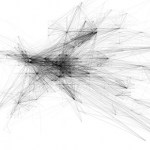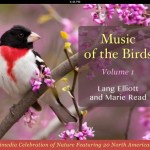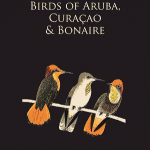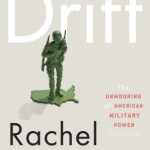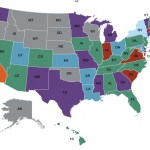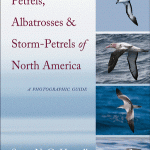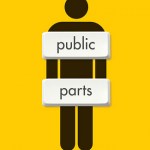book review
William Gibson, first in his novel Burning Chrome and then later in the seminal Neuromancer, both coined and defined "cyberspace" as "a consensual hallucination experienced daily by billions of legitimate operators." His novels predate the universal adoption of the World Wide Web as a communication matrix, and his psychedelic fantasy of cyberspace–a kind of semantic space navigated by users in virtual-reality, where information takes form as navigable structures–is not quite (yet) our web, but he was correct in his estimation of the network as a hallucination.
Most of us know, on some…
Music of the Birds by Lang Elliott is a classic book and CD combo well over 10 years old, that provided bird lovers with a chance to learn to identify and appreciate the songs of numerous species. Over the last decade or so many other CD-based bird song offerings have become available. More recently, Lang teamed up with Marie Read to produce an iBook (iAuthored) version of Music of the Birds which takes advantage of the iAuthored iBook format in many ways. This is my first review of an iAuthored book, and obviously the first one on this blog, so I want to use the opportunity to discuss what…
The Rocks Don't Lie: A Geologist Investigates Noah's Flood by David Montgomery is new book on the Noachian flood. It is by a real life geologist and is not a creationist book. Might be a good gift for your annoying creationist relative.
Here is a write-up from the publisher:
In Tibet, geologist David R. Montgomery heard a local story about a great flood that bore a striking similarity to Noah’s Flood. Intrigued, Montgomery began investigating the world’s flood stories and—drawing from historic works by theologians, natural philosophers, and scientists—discovered the counterintuitive role…
John MacCormick's new book, Nine Algorithms That Changed the Future: The Ingenious Ideas That Drive Today's Computers, is very good. You should buy it and read it.
Among all the debates about whether or not absolutely everybody must without question learn to program (pro, con), it's perhaps a good idea to pause and take a look at exactly what programs do.
Which is what this book does. It starts from the premise that people love computers and what they can do but don't have much of an idea about what goes on inside the little black box. And then, what MacCormick does is take nine general types…
Here is a link to a an interesting new book by Julia Gordon. She just graduated from Washington University in St Louis as a graphic design major, and for her senior thesis she designed an informational book, using the chapter "Green Genes" from Stewart Brand's book "Whole Earth Discipline". For this project she used his text as the body for the book, and created additional images, graphics, maps, captions and footnotes to accompany the text.
When given the assignment to design an informational book for her thesis, she was excited to base it on Green Genes because she found it "eye…
Here in Minnesota, and in surrounding states, there is some real tension between Native and Immigrant communities. The poorest, most drug-ridden, down trodden and repressed communities here are often Native, and conveniently these communities tend to be (but not always are) located far away from urban areas or other places with a lot of white eyes. Health in Native communities is of major concern to the usual institutions and people that are concerned with such things.
Indians make White people nervous. White people are either worried that the Indian has kooties, or are criminals or…
Fool Me Twice: Fighting the Assault on Science in America by Shawn Otto has won the prestigious Minnesota Book Award. The award is very well deserved.
Here's my writeup of the book, and here's a radio interview with the author that we did a couple of months back.
Shawn's book is a critically important analysis of science policy, its potentials and failings, in a world of denialism and politics. As you know, Shawn has been involved with Science Debate (see the big badge on the sidebar?) and the Science Pledge. I'm pleased to announce that in the political campaign that I was recently…
It's probably best to start with what Marc J. Kuchner's new book -- Marketing for Scientists: How to Shine in Tough Times -- isn't.
It isn't a social media jackass recipe book for "Success through Twitter." It isn't a detailed treatise on marketing theory. It doesn't come with a guarantee of grants, publications and prizes if you follow it's instructions. In fact, it's hardly about Twitter or blogs or Facebook or Pinterest or any of that stuff at all.
Instead, it's a primer on why getting your message out is a good idea.
Marketing for humans, in other words, where humans = scientists.
Kuchner…
On Sunday, I interviewed Maggie Koerth-Baker, the author of Before the Lights Go Out: Conquering the Energy Crisis Before It Conquers Us. The interview was live on radio, but you can listen to it here as a podcast.
Maggie is the science editor at Boing Boing, a journalist, and has had an interest in energy and the related science and engineering for some time. Her book is an overview, historical account, and detailed description of the energy systems that we use in the United States, outlining the flow of watts, CO2 emissions, methods of making more watts, what we use it all for, and more…
If you are a birder and you are going on Spring Break (from the US), don't forget that there are birds where you are going. And, probably, there are bird books that cover your destination.
One of the really cool things about North American birding is that when you do go down to tye Yucatan, Caribbean, or Central America you'll see birds that are migratory and familiar, but in their other home (but just on their way back). They'll be surprised to see you!
I just got a copy of Birds of Aruba, Curaçao, and Bonaire, though I've got no personal travel plans for Aruba and environs at the moment…
Drift: The Unmooring of American Military Power by Rachel Maddow (signed by the author!) and I'm reading it with great interest, even though I'm totally swamped with other things. Damn you Rachel Maddow for writing such an engaging book!
I'm just starting it but wanted to share a couple of observations.
The nature of war in (well, 'by') America--and the nature of the military and government's relationship to it--evolved over time from the days of the Founding Fathers to the end of the Viet Nam era, as described in Rachel Maddow's new book, in very interesting ways. In particular, Maddow…
And they are! Just yesterday I was hanging around with a bunch off atheists and they were all pretty angry. They were even getting angry with each other. I could hear "get off my lawn" as a more or less constant droning sound in the background.
People who are not atheists, or who may be indifferent to religion but never thought about it much, might want to know what this is all about. One way to do this is to read a book that just came out, literally about five minutes ago, for the Kindle. This book is by my friend Greta Christina, and it is called Why Are You Atheists So Angry? 99 Thing…
In September, 1939, Germany invaded Poland, and soon after Jews living in ghettos in Poland's cities were identified, sequestered, rounded up, shipped off to work camps or concentration camps, and exterminated as part of what we know of today as the Holocaust. Several Jews managed to avoid being arrested by pretending to be something else, and some of those stories have been written up as histories or biographies.
One such story is that of Sabina S. Zimering. Sabina lives in the western suburbs of the Twin Cities today, and her grand daughter was in Amanda's class a few years ago. Sabina…
Walter Isaacson's book on Apple founder & CEO Steve Jobs is a fairly long book. It's not exactly a thriller either, especially since I know how it ends. As a result it took me a while to plow through it. I tended to read it in bursts of 40 or 50 pages over a few days then maybe put it aside for a while.
As a result, I ended up reading a bunch of other auto/biographical works at the same time. And there are some interesting parallels.
Ozzy Osbourne's I Am Ozzy and Tony Iommi's Iron Man: My Journey through Heaven and Hell with Black Sabbath are both great books. Like Jobs they are…
The vast majority of American public school students are not proficient in the level of science learning expected for their age group. The Thomas B. Fordham Institute has issued "The State of Science Standards 2012" as part of an effort to assess the causes of this dismal state of affairs. Here's a map summarizing their results:
State Science Standards Grades, 2012
Notice that some of the battleground states for the "Evolution-Creationism Controversy" have reasonable ratings. Notice also the vast regions of D and F states. In fact, in order to convey the meaning of it all, I've created…
Michael Mann, famous climate scientist, has released a book called The Hockey Stick and the Climate Wars: Dispatches from the Front Lines (also available as a Kindle edition). I've not read it yet but I thought you'd like to know about it.
Michael Mann is the guy who came up with the Hockey Stick graph and metaphor. Early reviews are positive:
In this meticulous and engaging brief on climate change research and the political backlash to legitimate scientific work, Penn State professor Mann narrates the fight against misinformation from the inside. (Publishers Weekly )
An important and…
Did you know that there is an entire group of birds called "Tube Noses" because they have tubes on their noses? Well, to be more exact, the term is "tubenoses" and the noses are beaks. The tubes are tubular nostril-like thingies that most (all?) birds have which are extra tube-like in the tubenoses. Thus the name.
Albatrosses, petrels, and storm-petrels, which includes shearwaters, make up the tubenoses, and the newly produced book Petrels, Albatrosses, and Storm-Petrels of North America: A Photographic Guide is about the North American species of this order, scientifically known as the…
"Reading" books on my iPod is usually great. I can download them from audible, and while I'm tending to the daily monotony that comprises much of labwork (tissue culture, prepping protein samples, running back and forth between centrifuges), I can just pop in my earbuds and keep my brain engaged with something interesting. But never have I so regretted listening to rather than reading a book as I did with Public Parts by Jeff Jarvis.
Not because he's a bad narrator - in fact he does better than many authors reading their own work (though he has the first audio typo I think I've ever heard…
I'm including here a list of all the books I've read in 2011, as well as some commentary on my particular year in reading. I always enjoy when people post these sorts of lists online and actually rather enjoy doing so myself.
I've been doing this for a few years now: 2010, 2009, 2008 and 2007.
If you've posted such a list online somewhere, please post a link in the comments. I'd love to see it!
The list of books I'm posting below includes all the books I started in 2011, with the exception of books that I'm currently reading. In other words, it also includes a few books I've abandoned…
Wildlife of Southern Africa , by Martin Withers and David Hosking, is new (August 2011) and good. If you are planning a trip to South Africa, Namibia, Botswana or anywhere nearby, or if you live there and like to go to the bush sometimes, consider it.
This is a pocket guide, it is small, has good photographs, is inexpensive, and accurate.
In my opinion, if you are travelling around Africa looking at wildlife, you will need a set of more specialized guides (which I've discussed at length elsewhere on this blog, see below), but this is a good extra to carry along or to have handy, depending…
